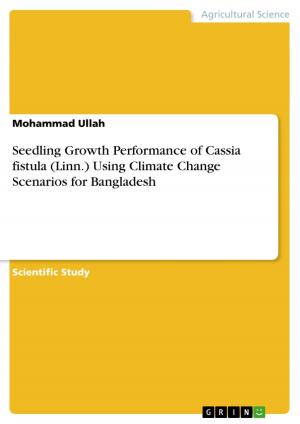Diffusion of Information in Agriculture in Senegal
The Case of Integrated Production and Pest Management
Business & Finance, Economics, Urban & Regional| Author: | Rudolf Witt | ISBN: | 9783638027946 |
| Publisher: | GRIN Publishing | Publication: | March 25, 2008 |
| Imprint: | GRIN Publishing | Language: | English |
| Author: | Rudolf Witt |
| ISBN: | 9783638027946 |
| Publisher: | GRIN Publishing |
| Publication: | March 25, 2008 |
| Imprint: | GRIN Publishing |
| Language: | English |
Diploma Thesis from the year 2005 in the subject Economics - Case Scenarios, grade: 1,3, University of Hannover (Institut für Entwicklungs- und Agrarökonomik), 68 entries in the bibliography, language: English, abstract: Using participatory training approaches such as farmer field schools (FFS) is perceived to be an appropriate technique to improve farmers' knowledge of complex agro-ecological systems and Integrated Production and Pest Management (IPPM) technologies. However, the FFS approach appears to be more costly than alternative less intensive approaches of knowledge transfer. High per capita expenditures are more justified, if knowledge can be disseminated through informal farmer-to-farmer interactions. Participatory extension approaches therefore rely on interpersonal channels and group mechanisms for diffusing greater awareness and facilitating learning among the group of untrained farmers. Although diffusion is not an explicit goal of the FFS approach, it is nevertheless a desired side-effect, which could invalidate the reproach of fiscal unsustainability. Several empirical studies found that knowledge generated by participatory extension training does not always sufficiently diffuse to non-participating farmers, because of the complexity of knowledge imparted in the course of a FFS. Farmers nevertheless exchange their experiences with each other, and thus, information about IPPM is being disseminated in the villages. This diffusion of information can have a significant impact on adoption behavior and be an important factor for a successful introduction and establishment of an innovation like IPPM. This case study, conducted in the Région de Niayes in Senegal in 2004, investigates the effects of training intensity on the diffusion of information. The objective of the study was to identify the factors determining the intensity of information diffusion. A set of predominantly closed questions was used to generate data on demographic, farm-, IPPM-, and information-related issues, which are considered important to capture the diffusion processes. The data has been analysed using a logistic regression model as well as the ordinary least-square (OLS) -estimation model. The results show that the proportion of trained farmers affects the dissemination of IPPM-related information. A higher share of FFS participants increases the individual exposure of non-participants. In addition, the quantity of information that is shared is higher. A second level of impact is the stage of adoption of FFS farmers and the observability of IPPM practices and benefits, which is a crucial variable for the intrinsic motivation of exposed farmers to adopt such technologies.
Diploma Thesis from the year 2005 in the subject Economics - Case Scenarios, grade: 1,3, University of Hannover (Institut für Entwicklungs- und Agrarökonomik), 68 entries in the bibliography, language: English, abstract: Using participatory training approaches such as farmer field schools (FFS) is perceived to be an appropriate technique to improve farmers' knowledge of complex agro-ecological systems and Integrated Production and Pest Management (IPPM) technologies. However, the FFS approach appears to be more costly than alternative less intensive approaches of knowledge transfer. High per capita expenditures are more justified, if knowledge can be disseminated through informal farmer-to-farmer interactions. Participatory extension approaches therefore rely on interpersonal channels and group mechanisms for diffusing greater awareness and facilitating learning among the group of untrained farmers. Although diffusion is not an explicit goal of the FFS approach, it is nevertheless a desired side-effect, which could invalidate the reproach of fiscal unsustainability. Several empirical studies found that knowledge generated by participatory extension training does not always sufficiently diffuse to non-participating farmers, because of the complexity of knowledge imparted in the course of a FFS. Farmers nevertheless exchange their experiences with each other, and thus, information about IPPM is being disseminated in the villages. This diffusion of information can have a significant impact on adoption behavior and be an important factor for a successful introduction and establishment of an innovation like IPPM. This case study, conducted in the Région de Niayes in Senegal in 2004, investigates the effects of training intensity on the diffusion of information. The objective of the study was to identify the factors determining the intensity of information diffusion. A set of predominantly closed questions was used to generate data on demographic, farm-, IPPM-, and information-related issues, which are considered important to capture the diffusion processes. The data has been analysed using a logistic regression model as well as the ordinary least-square (OLS) -estimation model. The results show that the proportion of trained farmers affects the dissemination of IPPM-related information. A higher share of FFS participants increases the individual exposure of non-participants. In addition, the quantity of information that is shared is higher. A second level of impact is the stage of adoption of FFS farmers and the observability of IPPM practices and benefits, which is a crucial variable for the intrinsic motivation of exposed farmers to adopt such technologies.















